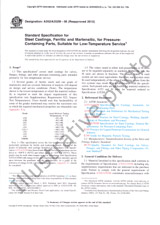We need your consent to use the individual data so that you can see information about your interests, among other things. Click "OK" to give your consent.
ASTM B568-98(2021)
Standard Test Method for Measurement of Coating Thickness by X-Ray Spectrometry
Translate name
STANDARD published on 1.4.2021
The information about the standard:
Designation standards: ASTM B568-98(2021)
Publication date standards: 1.4.2021
SKU: NS-1024131
The number of pages: 8
Approximate weight : 24 g (0.05 lbs)
Country: American technical standard
Category: Technical standards ASTM
The category - similar standards:
Annotation of standard text ASTM B568-98(2021) :
Keywords:
absorption, collimator, emission, filter, ratio, X-ray,, ICS Number Code 17.040.20 (Properties of surfaces)
Additional information
| Significance and Use | ||||
|
5.1?This is a sensitive, noncontact, and nondestructive method for measuring the coating thickness (and in some cases, coating composition) of metallic and some nonmetallic coatings over a range of thicknesses from as little as 0.01 ?m to as much as 75 ?m depending on the coating and substrate materials. It can be used to measure coating and base combinations that are not readily measured by other techniques. 5.2?The coating thickness is an important factor in the performance of a coating in service. |
||||
| 1. Scope | ||||
|
1.1?This test method covers the use of X-ray spectrometry to determine thickness of metallic and some nonmetallic coatings. 1.2?The maximum measurable thickness for a given coating is that thickness beyond which the intensity of the characteristic secondary X radiation from the coating or the substrate is no longer sensitive to small changes in thickness. 1.3?This test method measures the mass of coating per unit area, which can also be expressed in units of linear thickness provided that the density of the coating is known. 1.4?Problems of personnel protection against radiation generated in an X-ray tube or emanating from a radioisotope source are not covered by this test method. For information on this important aspect, reference should be made to current documents of the National Committee on Radiation Protection and Measurement, Federal Register, Nuclear Regulatory Commission, National Institute of Standards and Technology (formerly the National Bureau of Standards), and to state and local codes if such exist. 1.5?This standard does not purport to address all of the safety concerns, if any, associated with its use. It is the responsibility of the user of this standard to establish appropriate safety, health, and environmental practices and determine the applicability of regulatory limitations prior to use. 1.6?This international standard was developed in accordance with internationally recognized principles on standardization established in the Decision on Principles for the Development of International Standards, Guides and Recommendations issued by the World Trade Organization Technical Barriers to Trade (TBT) Committee. |
||||
| 2. Referenced Documents | ||||
|
We recommend:
Technical standards updating
Do you want to make sure you use only the valid technical standards?
We can offer you a solution which will provide you a monthly overview concerning the updating of standards which you use.
Would you like to know more? Look at this page.




 Cookies
Cookies
